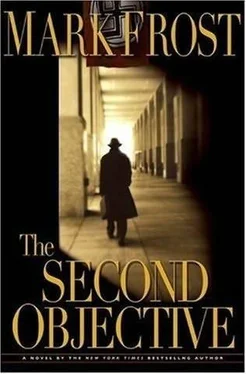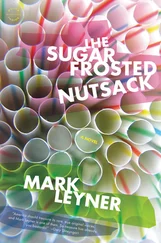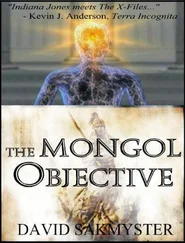“Have to say, that couldn’t have gone much better,” said Eddie, breaking the silence. “You see that scar on his face? Bet that wasn’t a cooking accident.”
“He’s a Corsican pimp and a drug dealer and he’ll cut your throat the first chance he gets.”
“Be that as it may, according to our books the son of a bitch always paid on time for goods received.”
“It’s one thing him doing business with the army, Eddie; the size of your outfit kept him in line. He knows we don’t have that kind of weight behind us. You’re sure your boys at the depot can deliver?”
“They’re in like Flynn. It’s the Christmas train, le jackpot of jackpots. Bringing in luxury rations for every dogface in Paris.”
“And the branch line runs through Versailles.”
“Yeah, I’ve worked it myself. Don’t worry, this is a bull’s-eye right down the stovepipe, baby. Pull off this one score, we retire to the land of tits and honey.”
“Yes. The American Dream. Hedonism and sloth.”
Eddie didn’t catch the irony. “Man, it’s a beautiful thing.”
36 Quai des Orfevres, Paris
DECEMBER 20, 10:00 P.M.
Earl Grannit and Bernie Oster had been sitting on a bench in the cavernous lobby of the city’s police headquarters for over two hours. A large electric clock ticked directly overhead, above a bulletin board plastered with sheets of official announcements. Grannit’s badge hadn’t made much impression on the harried civil servants manning the desks and scurrying through the halls. They watched as uniformed gendarmes hustled in a steady stream of suspects for processing through their overworked justice system. From a detective’s bullpen beyond the foyer the clatter of multiple typewriters clashed with the sound of raised voices shouting at each other in French.
“Business is booming,” said Bernie.
Grannit lit another cigarette, leaned forward, and ran a hand over his face. The man looked worn to the bone.
“You were a cop,” said Bernie. “In New York.”
“That’s right.”
Bernie looked around the room, turning the MP’s helmet around in his hands. “Is it any different here?”
“The same shit flowing down a different sewer.”
“Never been inside a police station before. Looks like a hell of a job.”
“It’s a hell of a world.”
“Are people just born bad, is that what makes them do this shit?”
“It’s a choice. Everybody’s always got a choice.”
Bernie hesitated. “Von Leinsdorf worked at a death camp.”
Grannit looked at him. “What?”
“Dachau’s a death camp. They’re killing people. Jews mostly, others too. I don’t know how many, maybe millions, all over Germany. Do they know about this back home?”
Grannit shook his head.
“Started with them taking people out of the cities. Deporting them to camps. We all knew about that. Nobody did anything. Then this started and nobody wanted to know.”
“For how long?”
“I don’t know. Maybe two years.”
“Von Leinsdorf told you this?”
Bernie nodded. A wave of emotion hit him. “I want to be a good person. But I was in that army. I did what I could, but it wasn’t enough. I don’t see any way to make that right.”
A clerk arrived to collect them. He led them into a warren of cubicles and offices and deposited them outside a door that read le commisaire . The clerk knocked; someone inside bid them enter.
A weary, middle-aged man stood behind a desk lighting a pipe. He wore an ill-fitting hand-knit sweater against the cold, waved them forward, and pointed to chairs in front of the desk. A small sign on his cluttered desk read INSPECTOR GEORGES-VICTOR MASSOU.
“My apology,” he said. “It took time to find someone of sufficient rank who could speak English. I have only just returned. How can I help?”
Grannit showed his credentials, referring to Bernie only as his associate. He unfolded the flyer with the sketch of Von Leinsdorf and handed it to Massou.
“We have reason to believe this man is in your city as of last night. He’s a German soldier disguised as an American, part of Otto Skorzeny’s commando brigade.”
“Yes. The famous Café de la Paix assassins. We are well aware. There were rumors of paratroops landing outside the city last night. Unverified.” From under the jumbled mass on his desk he located another flyer that featured Skorzeny’s photograph. “The café is under constant surveillance. It was my understanding your army is handling this investigation.”
“We spoke with senior security at SHAEF today as well as provost marshal of the military police in Paris. They’ve moved Eisenhower into the Trianon Palace under heavy security. Because only one man is left they feel they have the situation under control. We don’t think that’s the case.”
“How so?”
“We’ve been involved since this began six days ago. This individual we’re looking for is a lot more dangerous than they know or want to admit. They’re military men, not police officers.”
“As you are.”
“New York, homicide. That’s your beat, isn’t it?”
Massou nodded and puffed on his pipe, his gaze sharpening as he looked at them through the smoke. Bernie saw his polite formality fall away, leaving the same dispassionate, assessing eye that he’d seen in Grannit, a frank, collegial accord between the two men. Massou picked up the rough sketch of Von Leinsdorf again, taking a closer look.
“Tell me about this man,” he said.
Grannit gave an account of Von Leinsdorf and his crimes, leaving out Bernie’s role entirely. Massou listened without comment, occasionally taking a note. As Grannit finished, he handed Massou a mug shot and rap sheet on Eddie Bennings.
“Von Leinsdorf is probably in the company of this man, an American deserter and black marketer.”
Massou looked at Eddie’s picture. “Does he know who he is with?”
“We don’t have a way of knowing that. We believe both men have spent time in your city.”
“Then you must have some idea of the legion of places they could hide, yes? A city of ten million, in this kind of chaos? Montmartre, le Marais, Montparnasse. And everywhere scores are being settled. Over five hundred murders since the Liberation in August. Have you ever known such a period in New York?”
“Not while I’ve been there.”
“The number sounds trifling compared to the battlefield, but in cities like yours or mine? Catastrophe, the end of civilization. Entire neighborhoods where our authority has regained no foothold! Paris acquired some lamentable characteristics under the Boches . So, regrettably, did much of the police force.”
The phone on his desk rang.
“I have spent these last years in retirement, returning only three months ago-excuse a moment.” Massou answered the phone. “ Oui? Oui, oui, mon cher .” He covered the mouthpiece with his hand and whispered: “Madame Massou.” He went back to the call. “ Oui, cher, oui, un cassoulet serait beau. Oui, superbe. J’attends avec intérêt lui. Pas trop tard, j’espère. Est-ce que je puis apporter quelque chose? Oui, cher. Au revoir. ” He hung up. “Please pardon , she who must be obeyed, yes?”
“I’ll take your word for it.”
“If you could experience her cooking, you would understand completely.” He looked suddenly to Bernie. “You are not a policeman.”
“No, sir.” He glanced at Grannit and corrected himself. “Military, yes, not civilian.”
“It is somewhat different in the military. Doing this job on behalf of a nation, you may feel a sense of legitimacy.” Massou fastidiously refilled his pipe and lit it again. “The lieutenant and I, you see, we are not a part of proper society. Nor can we be. I may have a wife, a pleasant home, an old cat who keeps me company, but the rest of the time we are immersed in these acts of violence. We study the end result to reconstruct the passions which created it. On occasion we find those responsible.”
Читать дальше












